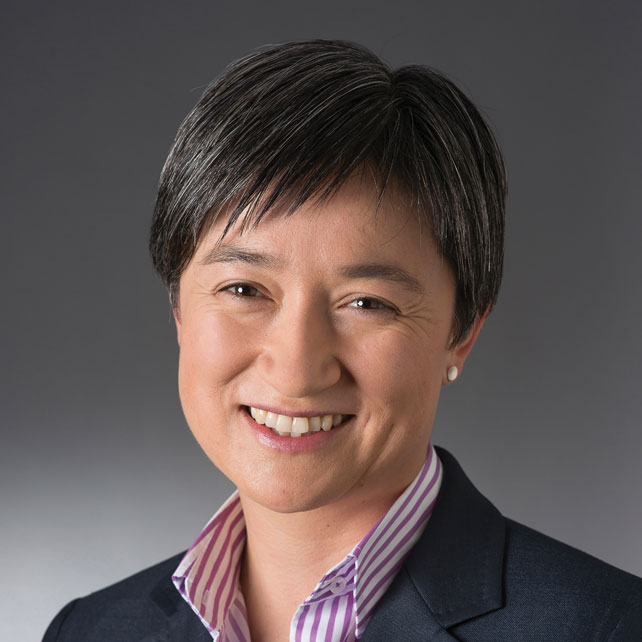
Senator The Honourable Penny Wong
ALUMNI AWARDS RECIPIENT
Leader of The Opposition in the Senate
Shadow Minister for Foreign Affairs
Graduate Diploma of Legal Practice
If it wasn’t for haemophobia, Penny Wong might have been a famous and successful surgeon. Post her school years she was accepted into Adelaide University’s Bachelor of Medicine/Bachelor of Surgery degree, deferred her studies and headed to Brazil as an exchange student. While in Brazil she volunteered in a local hospital – and just in time discovered that blood is a by-product of surgery and that she wasn’t OK with it. The phobia forced a re-think. She came back to Adelaide and studied Arts then Law. She received a BA (Jurisprudence) and LLB (Hons) from Adelaide University and a Graduate Diploma in Legal Practice from UniSA.
With her new credentials she became a lawyer, union adviser, union advocate and then she ran for Senate pre-selection.
She was elected to the Senate for South Australia in 2001, then again in 2007, 2013 and 2016.
She was Minister of Climate Change and Water, Minister for Climate Change, Energy Efficiency and Water and Minister for Finance and Deregulation.
“Law wasn’t a childhood dream of mine”, she says. “I chose medicine because that’s what hard-working Chinese daughters do.” The blood phobia robbed Médecins Sans Frontières of a potential new recruit but added a powerful voice in Parliament, an advocate for women, for equality, for the LGBTQI community, for multiculturalism, for people anywhere who feel they don’t belong in mainstream society.
Penny Wong was eight years old when she and her brother migrated to Australia from Malaysia with their Adelaide-born mother to build a new life following the breakdown of her parents’ marriage.
“The area we moved into was not a hub of multiculturalism”, she says, “and I was the first Asian most of the kids in my school had ever seen.”
Life was tough for a year or two but her mother’s extended family network gathered the little family together and helped them make the adjustment. But she has intimate knowledge of what it feels like to not fit in.
She didn’t let it faze her.
“While lots of people have an influence on your life, perhaps my biggest influence was my father’s mother who I called Poh Poh”, she says. “She lived through the deprivations of the Second World War in Sandakan”, (the same Sandakan of the Sandakan Death Marches) a large town in Sabah on the north-eastern coast of Borneo. When the war was finally over, 16% of the population of Sabah had been killed, along with 2,345 Allied prisoners of war held captive by the Empire of Japan during the Pacific campaign of World War II in the Sandakan POW Camp.
“Most of Poh Poh’s family died during the war and she was left to care for my father and his siblings”, says Penny.
“The influence she had on me was not what she said, but the life she lived. Her determination to survive taught me two things: remember how lucky you are, and remember the obligation you have. If you are given an opportunity, do something with it.”
And Senator Wong did. She was the first female to be appointed Leader of the Government in the Senate and, following Labor’s defeat at the 2013 Australian federal election, she was appointed the Leader of the Opposition in the Senate, again, the first woman to take that role.
In September 2016, still in Opposition, she added Shadow Minister for Foreign Affairs to her role as Leader of the Opposition in the Senate.
She has been described as pragmatic, ambitious, methodical, serious and committed, not a description that fits many of her parliamentary colleagues. Former politician Mark Latham once tried giving her the nickname ‘Wongy’ and hoped that it would catch on. Unsurprisingly it didn’t.
Failed Australian diminutives notwithstanding, she is compelled to seek a society and to work towards building a community in which everyone has a place and everyone belongs. Where equality is a central principle.
What’s next? She doesn’t look too far into the future, preferring to focus on the job she has now.
“I’d like to say something significant on foreign policy and the political debate around multiculturalism is only going to grow and I want to add my voice to that”, she says.


